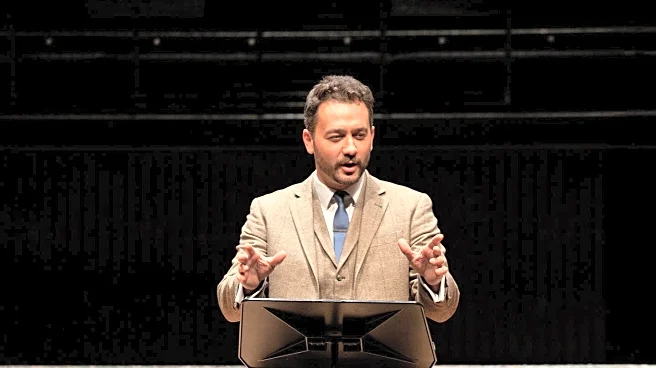What's Happening?
Columbia College Chicago, a renowned institution with a rich legacy in arts education, is facing significant financial challenges under the leadership of its new president, Shantay Bolton. Bolton, who took office on July 1, is tasked with addressing a $40
million structural deficit exacerbated by declining enrollment, which has dropped to 4,400 students from a peak of 12,000 two decades ago. The college has been struggling with financial instability, marked by a 49-day adjunct strike in late 2023 and subsequent program cuts and layoffs. Bolton, the first woman of color to lead the school, aims to stabilize enrollment, elevate the college's brand, strengthen philanthropy, and improve operational efficiency. Despite the hurdles, Bolton remains optimistic about a 'Columbia renaissance,' focusing on student-centered leadership and financial stability.
Why It's Important?
The financial challenges faced by Columbia College Chicago highlight broader issues in higher education, particularly for arts-focused institutions. Nationwide, college enrollment has been declining due to demographic shifts and changing perceptions of the value of a college degree. Columbia's situation underscores the vulnerability of midsize and small colleges that rely heavily on tuition revenue. The college's financial woes have led to a downgrade of its debt rating to 'junk' status, complicating future borrowing. Bolton's leadership and strategic planning are crucial for the college's survival and potential recovery, impacting faculty, students, and the local community. Her approach could serve as a model for other institutions facing similar challenges.
What's Next?
Columbia College Chicago is embarking on a strategic planning process to outline the next three years, focusing on stabilizing enrollment and improving operational efficiency. Bolton plans to build connections with local school districts to maintain enrollment levels and has launched initiatives such as a new student scholarship fund and partnerships with civic organizations. The college may face further tuition increases and potential cuts to academic programs and staffing as it seeks financial stability. The administration and faculty union have recently settled outstanding contract issues, indicating a move towards greater unity and collaboration. The college community remains cautiously optimistic about Bolton's leadership and the potential for a positive shift in campus dynamics.
Beyond the Headlines
The challenges at Columbia College Chicago reflect broader trends in higher education, including the impact of demographic changes and the reevaluation of the return on investment for college degrees. The college's focus on arts education makes it particularly vulnerable to these shifts. Bolton's leadership as the first woman of color to head the institution also highlights issues of diversity and representation in higher education leadership. Her background in human resources and business administration may bring a fresh perspective to the college's financial and operational challenges. The situation at Columbia could prompt discussions on the sustainability of arts-focused education and the need for innovative approaches to higher education management.















